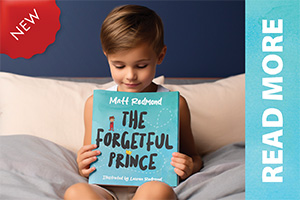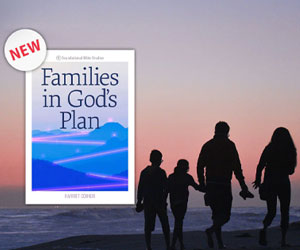
What to Tell Your Kids About Santa
How, what and when tell the kids about Santa
Andy Stirrup - Youthworks College
I teach a course on families at College in which I explain that families help cement our sense of belonging through cultivating their own culture and traditions. Our family tradition, however, nearly started World War III.
My wife and I had different experiences growing up – at her house there was no Santa, yet at mine we always put out a bucket of water for the reindeer, left mince pies and a glass of whisky for Father Christmas, and awoke the next day to find them gone. When I married Kathy we decided that our new family would not have Father Christmas/Santa, although within our own pattern of celebrating Christmas we would leave some smaller presents on the children’s beds for them to enjoy when they woke up.
World War III nearly broke out when we were staying with my sister. As they played together, our oldest (then four years old) announced to her cousin (also four) that Father Christmas wasn’t real. The first we heard about it was when my sister came storming over accusing us of spoiling Christmas. We quickly realised that we had to include within our family tradition a Santa Claus. We explained that lots of families played a game at Christmas in which they pretended Father Christmas was real and that it was important for us not to spoil that game. We needed to play along, yet our children knew what was really happening and knew to thank us if they liked the gifts at the end of their beds each Christmas morning.
Did we spoil Christmas? I decided to ask our two older children what they thought.
Chris Stirrup (now 18)
I have always been brought up with the truth of Santa Claus and I believe that my parents made the right decision in telling me about Santa. Knowing what they’ve done I feel that I can appreciate them and the lengths that they have gone to for me to a greater extent than I could have, had I thought that my presents were given to me by a mystically happy and kind-hearted man (with a massive bank account). The fact that I knew that Santa was a fallacy made no difference to my enjoyment of Christmas, which, for me, shouldn’t be centred on Santa.
Alex Stirrup (now 20)
Although my parents always told me that Santa wasn’t real, I’ve never felt as though I missed out on some integral part of childhood. To be honest, I’ve never really seen the appeal of Santa. I know Santa is hardly a really serious deception, but it’s still not the truth. Looking back over my life so far, I can’t remember my parents ever lying to me (so I consider them trustworthy). I think it’s your choice what you tell your kids. But I’m glad my parents chose to tell me the truth.
Graham Stanton – Youthworks College Principal
We do Santa. We’re not much into lining up in the shopping centre to let our children sit on a strange man’s knee, but we do put out a glass of milk on Christmas Eve, hang their Christmas stockings on the end of their beds, and tiptoe into the children’s bedrooms once we’re sure they’re asleep. Our children are 11, 9 and six and it’s all a bit of fun.
There are some rules though. The main one is that Santa doesn’t make threats leading up to Christmas. Disciplining children is a constant challenge, and even though the warning ‘if you’re not good Santa won’t come’ might be effective once December arrives in earnest, it’s not the way that God disciplines us, so we don’t want to do it for our kids.
The other rule is Santa doesn’t give the best presents! If the kids are going to thank someone for a present they really like we’d rather they thank us than some imaginary red suited man, no matter how jolly he is. Santa gives socks and underwear, and colouring books and pencils – the sorts of presents that can keep the children excited in their rooms for another hour after waking up so that we can steal a few extra minutes of sleep!
Of course, there are logistical challenges to playing the game, and we’re not very good at that bit. A couple of years ago our eldest daughter Juliet asked my wife, ‘Why are the presents from Santa wrapped in the same paper as the presents from you and Dad?’ Uh Oh! Busted! But in her wise way, Katy looked at Juliet and asked her, ‘Do you really want to know the answer to that question?’ I reckon that was a brilliant response. There was no lie, and no need to say what’s true just because it’s true. Juliet thought about it, smiled, and said ‘no’, and bounded off to enjoy another day of childhood.
About six months later, Juliet and I were doing something together and it was one of those precious moments of parenting when she was ready to ask some deep questions and I was available to answer them. Juliet was wondering whether she was a real Christian or not, because sometimes she wasn’t sure whether God and Jesus and the Holy Spirit were real. We talked about God being real even though we couldn’t see him, and we talked about believing what God says to us about himself in the Bible. And then Juliet said, ‘I’m sort of not sure whether God is like Santa and the tooth fairy, whether they’re all actually real or not really’. It was a golden moment, and so to make the most of it I leant closer, and said in a soft voice, ‘If you promise not to tell your little brother and sister, Santa and the tooth fairy aren’t real, but God is.’ And she smiled.
The thing is, that her world wasn’t shattered. She didn’t withdraw in waves of doubt, questioning whether she could ever trust her parents again. She smiled because she was growing up. We’d been playing a fun game and now she was in on the secret. That’s just a whole new layer of fun!
It’s true that elements of the Santa game don’t actually match with verifiable reality (that is, they’re a lie). But it’s not much different from playing hide and seek with a three-year-old who’s quite clearly under the blanket in the middle of the room and walking past saying, ‘Now where could he be? I can’t find him!’ Of course it’s more ‘true’ to walk into the room and say, ‘You’re under the blanket in the same place where you were last time’, but it’s not really the point of the game.
The Stanton Santa is a bit of a game. It’s not a game we take very seriously. Raising our children in the fear and instruction of the Lord however is a responsibility and privilege given us by God. Our kids hear about Santa once a year; they talk to God at least twice a day and listen to his Word every morning. Our hope and prayer is that as the games and fairytales of childhood fade their relationship with God will grow more and more profound.
Kerrie Newmarch – Youthworks College Head of Student Welfare and Ministry Placement
Faith Development Theory which we explore at College explains that there are four stages that build upon each other and lead to ownership of faith – ‘experience’, ‘affiliation’, ‘searching’ and ‘owned’. It would seem to me that children can ‘experience’ and ‘affiliate’ with the idea of Santa, if that is the family tradition, but never move to the ‘owned’ stage of faith in Santa. This happens naturally and without trauma, because as they develop in their thinking they enter into the ‘searching’ stage. At this point they are able to discern that this is a tradition of our western culture and not one that is practiced in all cultures. They start to ask basic questions like, ‘How does Santa get to so many children in one night?’ or, ‘How does he get into our house which has no chimney?’ As Christians, it is therefore important that our children ‘experience’ and ‘affiliate’ with the real meaning of Christmas so that in their ‘searching’ stage of faith development they are able to ask questions and move towards a confident, owned faith in Jesus.
Santa was a significant part of my family’s tradition as I grew up. The visit to David Jones (Retail store) for our photo on Santa’s knee, Christmas parties with a visit from Santa, presents at the end of our bed and lots of songs about Santa Claus and reindeer were all included. It was only natural for me to transfer these experiences to my own family once I had children. However, our first family photo with Santa, with our children looking terrified, caused my husband and I to ask, ‘What do we want Christmas to mean to our children? How can we engage faithfully with God’s word and connect with our families, friends and community as they engage with Christmas?’
We tried to do this in many different ways, including:
- Playing along with the Santa tradition, yet making sure our children knew the real meaning of Christmas and were encouraged to tell others about Jesus.
- Informing the children about the story of St Nicholas for their own understanding of Santa’s origins.
- Sometimes having a ‘birthday cake’ for Jesus as part of our Christmas celebrations.
- Emphasising the importance of gratitude for our gifts and using the TEAR catalogue as they got older.
- Sharing Christmas with friends, neighbours and the local community through caroling, decorating houses together, and being part of the Christmas Eve street party every year has also been a significant tradition for us.
My adult daughter, Jess, says seems to have found our traditions helpful and Christ-focused. She says, ‘For me, Santa was part of Christmas when I was little, but only a minor detail and never the main focus. Going to church and being with family was more important. I think the presents part was always exciting, but not fully connected with Santa … In fact, I don't know if I ever really believed that Santa was real as he didn’t seem particularly relevant or important.
Sharing with our community and singing carols were very significant for me – I guess because the songs were based on the Christmas story it meant we focused on Jesus a lot more in that way.’
Jim French – Youthworks College Vice Principal
My wife comes from Germany and has lived many years in Spain so I think the customs we will have in our family will be varied and different. Obviously our goal is to teach our children to love and know Jesus (when I first wrote this article we were still expecting our first child; now we have a two-year-old daughter and a two-week-old son). We don’t do the ‘Santa Claus thing’ at Christmas since we personally feel it takes away the focus on celebrating the birth of Jesus. Yet we also won’t tell our children that Santa is from Satan (although it is an anagram), or that other kids are stupid to believe in Santa. Rather, whilst respecting other parents and the surrounding culture, we think it is better to tell them that since you get presents at a birthday, we remember Jesus’ birthday by giving each other presents.
With this in mind it was important when I taught primary school Special Religious Education (SRE) to chart the narrow strait between not telling the school children that Santa doesn’t exist, and speaking the truth about Jesus. Following the lead of Stuart Pearson, with whom I worked in Liverpool, I used a play to teach the difference between Santa Claus and Jesus in regards to giving gifts and their longevity. A key part of this was the Christmas song:
You better not shout, you better not cry, you better not pout. I’m telling you why: Santa Claus is coming to town. He sees you when you’re sleeping. He knows when you’re awake. He knows when you’ve been bad or good. So be good for goodness sake!
The main point of the play was that the message of Santa tells children they have to be good to get presents. Yet Jesus says exactly the opposite. His gift is for those who haven’t been good. The reason Jesus was born was in order to live the life that we should have but couldn’t live and to die the death that we deserve because we aren’t good!
The other difference between the gifts that Santa gives and the gift that Jesus is and brings is how long it lasts. Santa’s gifts usually don’t make it through to the end of the day let alone through to next Christmas. In contrast, the gift that Jesus is and brings last forever:
For God so loved the world that he gave his one and only Son, that whoever believes in him shall not perish but have eternal life. John 3:16
Ruth Lukabyo – Youthworks College Lecturer
My husband and I decided together that when we had kids that we would include Santa as part of our family tradition. We both came from families where the children had enjoyed this game of make-believe and thought that it was great fun. Our concern, of course, was (and is) that Santa and ‘getting stuff’ becomes the message that the kids hear at Christmas, rather than the great news of God becoming a man to redeem his world.
How do we include Santa, yet sideline him at the same time? On Christmas Eve, the kids leave out snacks for Santa as well as food for the reindeer. On Christmas morning, there are small gifts in a stocking ‘from Santa’ which the kids open (at some ridiculous time in the morning). After church, when we have celebrated Jesus’ generosity to us, we all come home and exchange our real gifts to each other (that is, we don’t want Santa to get the credit!)
As for the issue of lying to our children that many Christian parents are concerned about, we have always encouraged our children to be imaginative; to dress up as Spiderman; to have baby dolls and to enjoy the world of imagination. Santa is a ‘real’ part of this world in the same way as characters in books are. As the children get older we say to them that Santa is a game we play and when they ask if he is real, we say ‘no’. Our middle child, Lucy, who is now 10 years old, has been told many times by her brother and sister that Santa is not real, but she enjoys the fantasy too much. She covers her ears and shakes her head. She wants to believe!
The original version of this article first appeared on the Sydney Anglicans website at [url=http://www.sydneyanglicans.net/archive/indepth/is_santa_ho_ho_homeless/]http://www.sydneyanglicans.net/archive/indepth/is_santa_ho_ho_homeless/[/url]
For more articles from Growing Faith, subscribe to our monthly e-newsletter.
To hear about the latest books and resources from Youthworks Media, subscribe here.




